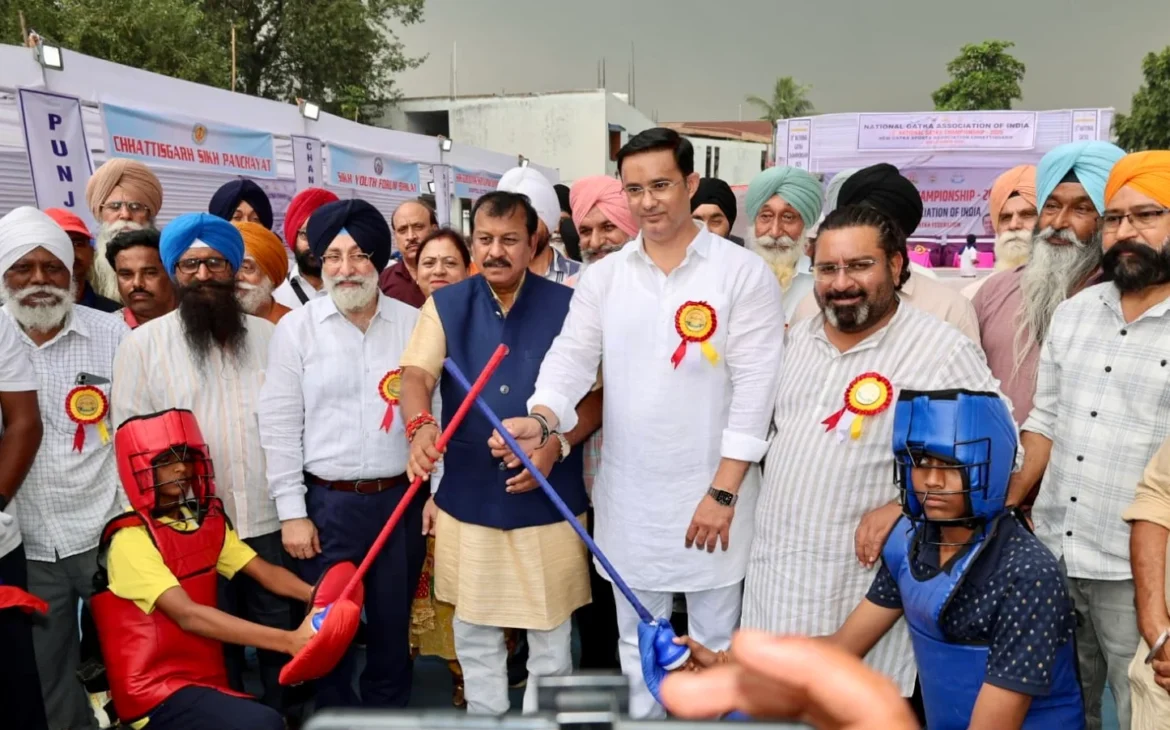Bhilai/Chandigarh, 10 Oct 2025 – The 13th edition of the National Gatka Championship commenced on Friday at Guru Nanak English Senior Secondary School, Bhilai, with a vibrant display of culture and martial tradition, organised by the National Gatka Association of India (NGAI) in partnership with the New Gatka Sports Association Chhattisgarh.
Gatka is a traditional Sikh martial art that originated in Punjab and has deep roots in Sikh history and spirituality.
It involves the use of wooden sticks (called soti) and various traditional weapons such as swords, shields, spears, and kirpans. The art form is not just about combat—it combines self-defense, physical discipline, and spiritual practice. Practitioners often perform rhythmic, dance-like movements synchronized with devotional music or shabads (hymns).
Historically, Gatka was practiced by Sikh warriors known as Nihangs and the Khalsa army established by Guru Gobind Singh in the 17th century. It was developed to defend righteousness and protect the oppressed. The practice embodies Sikh principles of bravery (bir ras), discipline, humility, and service.
According to organisers Chhotu and Jaswant Singh Khalsa, over 400 boys and girls from twelve states are participating in the championship, competing in individual and team events in Gatka Soti and Farrie Soti. The tournament will conclude on Sunday, October 12, with medals and certificates awarded to the winners. Chhotu also announced that Chhattisgarh gold medalists will receive cash prizes and special recognition for their achievements.
The three-day tournament celebrates India’s martial legacy and the Sikh spiritual tradition, showcasing Gatka as a symbol of courage, discipline, and cultural pride.
The event was inaugurated by Vijay Baghel, Member of Parliament from Durg, while social leader Prem Prakash Pandey attended as guest of honour. The ceremony was further graced by Harjeet Singh Grewal, President of NGAI and World Gatka Federation; Jasbir Singh Chahal, Chairman of Chhattisgarh Sikh Panchayat; Inderjeet Singh Chhotu, President of New Gatka Sports Association Chhattisgarh; Jaswant Singh Khalsa, Secretary; Malkeet Singh Lallu; and other prominent dignitaries.
Addressing the gathering, Baghel highlighted Gatka’s historical and cultural significance. “Gatka is more than a martial art; it is a testament to India’s glorious past and the enduring spirit of Sikh history. Promoting this indigenous tradition nurtures our cultural heritage and inspires youth with courage, discipline, and devotion taught by our revered Gurus,” he said.
Pandey lauded Chhattisgarh for hosting the national event, noting, “It is a proud moment for the state. Gatka not only encourages fitness and discipline but also strengthens inter-community harmony by promoting unity and cultural preservation.”
Grewal expressed the NGAI’s commitment to advancing Gatka as both a traditional art and a modern sport. “Through championships like these, we aim to groom players for global competitions, with the ultimate goal of seeing Gatka featured in international multisport events, including the Olympics,” he said.
The championship received robust support from numerous local organisations and Gurudwaras, including Gurudwara Beche Janaki Ji, Zone-2 Khursipar; Gurudwara Sri Guru Hargobind Sahib Ji, Camp-2 Bhilai; Gurudwara Sri Guru Arjun Dev Ji, Housing Board Bhilai; Gurudwara Sri Guru Tegh Bahadur Ji, Camp Bhilai; Gurudwara Sri Guru Singh Sabha, Guru Nanak Nagar; Gurudwara Baba Budha Sahib Ji, Kodka; Gurudwara Baba Deep Singh Ji, Supela; Gurudwara Mata Gujri Ji, HUDCO; Gurudwara Sri Guru Singh Sabha, Sector-6; Chhattisgarh Sikh Panchayat; Sikh Youth Seva Samiti; Guru Nanak School Sector-6; Punjabi Bhaichara; Sikh Youth Forum; Guru Nanak Senior Secondary School; and the Punjabi Cultural and Welfare Association.
Today, Gatka is performed both as a martial sport and a cultural tradition during religious festivals like Hola Mohalla and Vaisakhi. It has evolved into an organized competitive sport in India and abroad, with national and international federations promoting it globally

